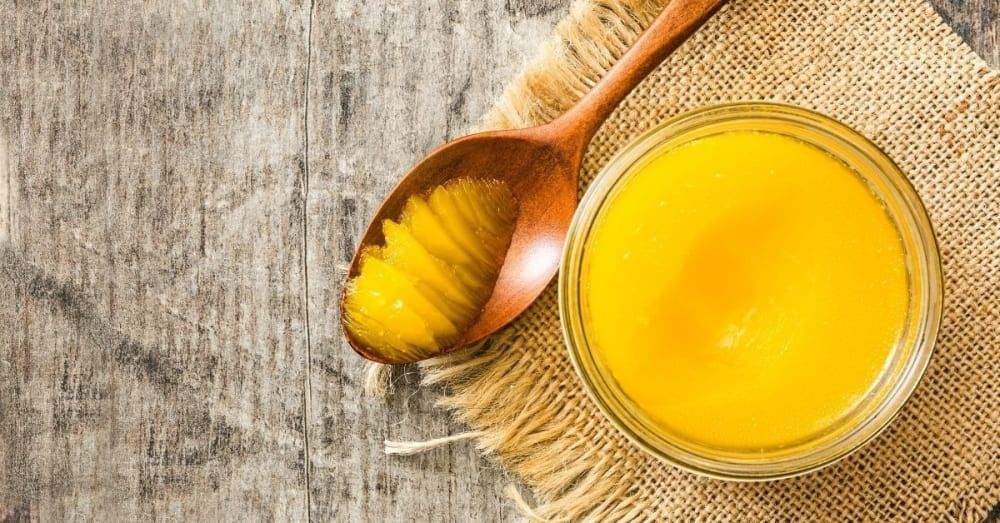Calories in Ghee, Nutrition, Health Benefits, More | Bodywise

Ghee is one of the supreme food items that is consumed by the majority of people. It is consumed in various ways such as on chapati or roti, in sabzi, porridge or khichdi, parathas, sweets, etc. However, not many people are aware of the nutritional content of ghee and its health implications. Let’s find out how many calories we get from ghee and if it is healthy or not.
How Many Calories in 1 Tbsp of Ghee?
The number of calories in one spoon ghee (13 g) is 112 kcal. Almost 100% of ghee calories are provided by fat. Overall, 1 spoon ghee calories amount to 31% of the daily calories required by an adult in a 2000 kcal diet.
Ghee is majorly consumed with roti as a topping. The number of calories in 1 roti with ghee (weighing 56 g) is 256 kcal. Out of these calories, 61% is provided by fat, 33% is provided by carbohydrates, with fibre being 4.2 g, and 6% is provided by protein. It is advised to put only 1 teaspoon of ghee on one chapati. 1 teaspoon ghee calories (4.3 g) amounts to 37 kcal.
Ghee Nutrition
Is Ghee Good for Health?
As it is a low or zero source of various macronutrients, there is a lot of debate around ‘is ghee healthy?’. Well, it is rich in healthy fats, vitamins, and antioxidants and helps our body absorb these nutrients efficiently. It has also been promoted by ayurvedic medicines as a natural solution for many health issues. So, yes, ghee is good for health.
Here are some health benefits that you can derive by consuming ghee:
1. Boosts Immunity
Ghee is rich in butyric acid, a fatty acid that promotes overall health by producing T cells that help fight various diseases.
2. Promotes Digestive Health
Due to the presence of butyric acid, ghee aids in digestion and maintaining healthy intestines while keeping away constipation and other related issues.
3. Provides Energy
Ghee is an excellent source of energy due to the various fatty acids. In India, pregnant women or new mothers are treated with Indian delicacies such as laddoo, halwa, panjiri, etc., made from ghee as natural energy providers. These food items are best consumed in winters to keep our bodies warm from within.
4. Reduces the Risk of Chronic Diseases
Ghee has a high heat point and does not produce free radicals responsible for chronic diseases like cancer, liver dysfunction, etc.
5. Promotes Heart Health
Ghee is rich in fat and has a high amount of monounsaturated fat, which is considered healthy and promotes healthy cholesterol. It helps keep heart disease at bay.
6. Makes Bones Stronger
Ghee is known to prevent tooth decay and atherosclerosis (a disease in which cholesterol plaque builds up in the wall of arteries) due to the presence of vitamin K, which helps in absorbing calcium.
7. Has Healing Properties
Ghee has butyric acid that has anti-inflammatory properties. It helps heal burn wounds and swelling and soothing inflammation caused in the body.
8. Balances Hormones
Ghee is rich in vitamins A and E, which are known to balance hormones and ultimately help with other health issues such as loss of appetite, irregular periods, infertility, thyroid dysfunction, etc.
9. Promotes Skin Health
Ghee has a high content of fatty acids and antioxidants that help in the nourishment and hydration of the skin. You can either consume it or make a homemade mask and apply it directly.
Also Read: Upma Calories, Types, Nutrition, PRO Tips ~ Nutritionist Backed
Is Ghee Good for Weight Loss?
Many people think that avoiding fatty foods is a key to weight loss. So, they are under the impression that ghee is unsuitable for their weight loss diet. However, our body requires every nutrient in an adequate amount p to be healthy. Especially in our weight loss journey, we must not exclude any of the macronutrients.
Fat in ghee is considered very healthy, and it plays a significant role in helping us lose weight. The more we consume ghee, the more our metabolism gets triggered. It helps in burning all of the extra fat in our body while making space for healthy fat that provides us energy.
Therefore, consuming ghee in a moderate amount is an excellent way to ensure more effective weight loss.
Potential Side Effects of Ghee
Though ghee has various health benefits when consumed in suitable quantities, too much of it can have effects on health due to the high presence of saturated fats and cholesterol. This can lead to an elevation in the risk for heart diseases or excessive weight gain and obesity. Therefore, ghee should always be consumed moderately.
Summing Up on Ghee Calories, Nutrition & Health Benefits
Other than on rotis and in sabzis, ghee can be a perfect substitute for your regular refined oil at home and used to make parathas, fried items, etc. However, our intake of ghee should be monitored closely to retain only the good parts of it. In case of any allergic reaction or existing health issues, one should always seek the advice of a medical professional before adding ghee to their diet.
References
- K K Aggarwal, P-Y Zhang, 2015; Omega-3 fatty acids and cardiovascular disease - https://pubmed.ncbi.nlm.nih.gov/25720716/
- Laura J. den Hartigh, February 2019; Conjugated Linoleic Acid Effects on Cancer, Obesity, and Atherosclerosis: A Review of Pre-Clinical and Human Trials with Current Perspectives - https://www.ncbi.nlm.nih.gov/pmc/articles/PMC6413010/
- Roberto Berni Canani, Margherita Di Costanzo, March 2011; Potential beneficial effects of butyrate in intestinal and extraintestinal diseases - https://www.ncbi.nlm.nih.gov/pmc/articles/PMC3070119/
